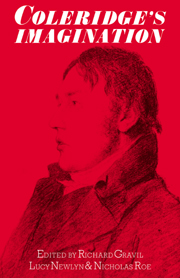Book contents
- Frontmatter
- Contents
- Pete Laver: a memoir
- Abbreviations
- Introduction
- Romantic imagination, nature and the pastoral ideal
- ‘The infinite I AM’: Coleridge and the Ascent of being
- Struggling with the contingent: self-conscious imagination in Coleridge's notebooks
- Coleridge's rejection of nature and the natural man
- The imagination of Mrs Samuel Taylor Coleridge: unknown inspiration of an unknown tongue
- ‘As much diversity as the heart that trembles’: Coleridge's notes on the lakeland fells
- ‘Leaping and lingering’: Coleridge's lyrical ballads
- ‘Radical Difference’: Coleridge and Wordsworth, 1802
- Imagining Wordsworth: 1797–1807–1817
- The Otway connection
- Imagining Robespierre
- Coleridge's Dejection: imagination, joy and the power of love
- Imagining naming shaping: stanza VI of Dejection: an Ode
- Mythopoesis: the unity of Christabel
- The languages of Kubla Khan
- Notes on the contributors
- Index
The imagination of Mrs Samuel Taylor Coleridge: unknown inspiration of an unknown tongue
Published online by Cambridge University Press: 04 August 2010
- Frontmatter
- Contents
- Pete Laver: a memoir
- Abbreviations
- Introduction
- Romantic imagination, nature and the pastoral ideal
- ‘The infinite I AM’: Coleridge and the Ascent of being
- Struggling with the contingent: self-conscious imagination in Coleridge's notebooks
- Coleridge's rejection of nature and the natural man
- The imagination of Mrs Samuel Taylor Coleridge: unknown inspiration of an unknown tongue
- ‘As much diversity as the heart that trembles’: Coleridge's notes on the lakeland fells
- ‘Leaping and lingering’: Coleridge's lyrical ballads
- ‘Radical Difference’: Coleridge and Wordsworth, 1802
- Imagining Wordsworth: 1797–1807–1817
- The Otway connection
- Imagining Robespierre
- Coleridge's Dejection: imagination, joy and the power of love
- Imagining naming shaping: stanza VI of Dejection: an Ode
- Mythopoesis: the unity of Christabel
- The languages of Kubla Khan
- Notes on the contributors
- Index
Summary
‘If you ever have an owl dressed for dinner, you had better have it boiled, and smothered in onions, for it is not good roasted’: Robert Sou they in a letter of 14 September 1821, to his lifelong friend, Grosvenor Charles Bedford. Southey had been given an owl shot by his young neighbour Raisley Calvert (who explained that he had not known what kind of bird it was when he fired at it). As the Wordsworths were to be dining at Greta Hall, Southey decided that roast stuffed owl was a dish well suited to the author of The Excursion and so: ‘I ordered it to be dressed and brought in, in the place of game that day at dinner. It was served up without the head, and a squat-looking fellow it was, about the size of a wood-pigeon, but broader in proportion to its length. The meat was more like bad mutton than anything else. Wordsworth was not valiant enough to taste it. Mrs W. did, and we agreed that there could be no pretext for making owls game and killing them as delicacies.’
Southey's sense of humour was distinctly of the schoolboyish sort. He had a keen perception of the comical and the appearance of an owl on the Greta Hall dinner table when Wordsworth was the guest of honour must have struck him as altogether delightful, and even more delightful to see the Bard refuse the dish. This was the kind of thing that kept Southey laughing, and when Southey laughed all his household laughed with him; merriment is infectious.
- Type
- Chapter
- Information
- Coleridge's ImaginationEssays in Memory of Pete Laver, pp. 79 - 87Publisher: Cambridge University PressPrint publication year: 1985



